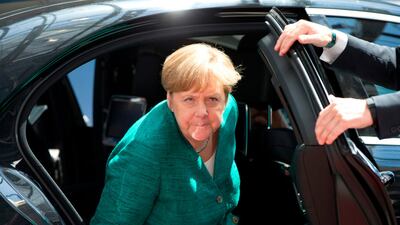European Union leaders were set for a fractious two-days of lobbying to try to strike a deal on the thorny issue of migration that threatens the existence of the 28-nation bloc.
The rise of right-wing parties across the bloc has seen the EU struggle to balance their anti-migrant concerns with its long-cherished ideal of borderless travel between member states.
Angela Merkel – whose own political future may be decided by the issue at the two-day summit – told German lawmakers that “Europe has many challenges, but that of migration could determine the fate of the European Union.”
The German chancellor needs to strike deals to prevent the fall of her fragile ruling coalition that relies on support from an anti-migrant sister party. She received early support when the leaders of Spain, Greece, Finland and Luxembourg all expressed support for her plan to curtail so-called “secondary migration” of refugees who arrive at the EU’s southern border before heading north to Germany.
Spanish Prime Minister Pedro Sanchez, who met Mrs Merkel earlier this week, told reporters that European solidarity on migration was vital “especially with Germany which is now suffering a political crisis”.
The current political crisis dates back to events in 2015 when more than one million people travelled to Europe to escape war in Iraq and Syria and poverty. Mrs Merkel’s open-door policy saw the bloc’s richest nation accept the majority of the new arrivals but sowed the seeds for the rise of the anti-migrant right-wing in her country that threatens to topple her. She maintained on Thursday that it was the right thing to do.
But she is under pressure from her coalition partner to shut Germany’s borderswith officials fearing it will have a domino effect. Neighbour Austria would follow suit and Italy – an important first stop for migrants fleeing north - permanently refusing to accept migrants at its ports.
Italy’s new anti-establishment government has already refused to allow charity rescue boats to land at its ports. The hardline interior minister Matteo Salvini travelled to Libya this week to press his case for reception centres on Libya’s southern border of Libya to stem the migration flow into Europe.
__________________
Read more:
France and Germany are trying to relaunch Old Europe as the forces of populism circle
Migrant rescue ship in limbo as EU nations argue over deal
__________________
France has spectacularly fallen out with Italy over the issue, while Spain has been forced to step in to handle new arrivals left stranded in rescue boats in the Mediterranean. The rise of populist governments in eastern Europe has added to the combustible mix and made the issue of migration the most pressing issue for the leaders to tackle, relegating Brexit to the sidelines.
Poland and Hungary are among those who have steadfastly refused to accept a quota of new arrivals, forcing leaders to abandon plans for a new grand deal on immigration. Mrs Merkel will instead seek a ‘coalition of the willing’ and strike agreements with individual countries.
The EU has proposed “regional disembarkation platforms” – processing centres in countries like Algeria, Egypt and Morocco aimed at preventing people from leaving the Mediterranean shores in overfilled boats in the first place. The EU hopes UN agencies for refugees and migration would run such centres.
“A precondition for a genuine EU migration policy is that Europeans effectively decide who enters European territory,” EU Council President Donald Tusk said in an invitation letter to the leaders. “Failure to achieve this goal would in fact be a manifestation of our weakness.”
It is not clear which countries would agree to hosting such centres, how much it would cost and how EU nations would fulfil obligations to accept people fleeing to Europe in fear of their lives.

